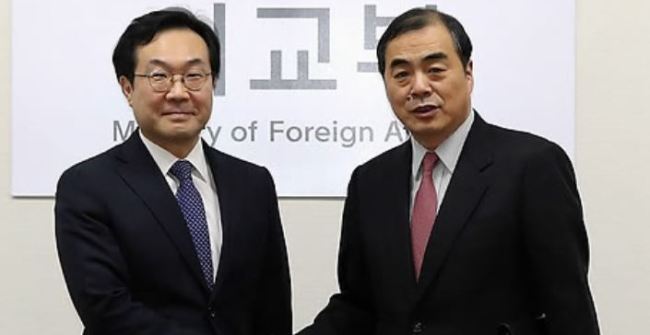Top nuclear envoys of South Korea and Japan vowed Monday to enhance bilateral diplomatic efforts to peacefully resolve the North Korean nuclear crisis, a day before high-level talks between the two Koreas are to be held in the South.

Lee Do-hoon, special representative for Korean Peninsula Peace and Security Affairs, met his counterpart Kenji Kanasugi, in Seoul and discussed measures to bring North Korea to the table for dialogue while maintaining a close partnership in dealing with the North, the Foreign Ministry said.
The move comes as South Korea is working to strengthen diplomatic cooperation with its neighboring Northeast Asian countries in resolving the North Korean nuclear issue, mindful of their cautious stance toward North Korea’s peace overture and developments in inter-Korean relations.
The meeting between Lee and Kanasugi came one day before high-ranking officials of the two Koreas are to sit down in the truce village of Panmunjeom for the first time in more than two years to discuss the North’s possible participation in the PyeongChang Olympic Games to be held from Feb. 9-25.
On Friday, Lee met with his Chinese counterpart Kong Xuanyou in Seoul to discuss North Korea’s nuclear program.
Lee also plans to visit the US on Wednesday to meet with his US counterpart Joseph Yun to discuss the results of the inter-Korean talks scheduled for Tuesday and follow-up measures on a three-day trip, the ministry said.
While South Korea and Japan stand united against North Korea’s nuclear and missile threats, there are challenges ahead for their relationship amid the possibility of South Korea seeking to scrap or re-negotiate the 2015 agreement.
On Monday afternoon, Kim Yong-kil, director-general of Northeast Asian affairs, and Kenji Kanasugi, Japan‘s director-general of Asian and Oceanian affairs, held a meeting over the 2015 Korea-Japan deal on Korean victims of Japan’s wartime sexual slavery.
It was their first working-level talks since a Seoul task force revealed that Park Geun-hye administration had not disclosed some of the sensitive details of the deal to the public and failed to sufficiently consult with victims before signing the deal.
President Moon Jae-in called the deal “gravely flawed,” saying the agreement failed to resolve the issue. The Foreign Ministry is expected to announce its decision on Tuesday on whether to retain, discard or renegotiate the controversial agreement, Yonhap News Agency reported, citing an unnamed source. “It will not be a renegotiation or scrapping (of the deal),” the source was quoted as saying.
Asked whether the deal could be scrapped, Foreign Minister Kang Kyung-wha said “all options are possible.” Kang has been meeting with victims of Japan’s sexual enslavement since last weekend, seeking to listen to the victims before the government makes its final decision.
In the agreement -- described by the two countries as “final and irreversible” -- Japan offered funds to a foundation and an apology to the surviving victims in return for Seoul’s promise not to raise the issue again in international forums.
Japan urges South Korea to abide by the agreement, saying that any attempt by South Korea to revise the deal would harm the two countries’ relations. Chief Cabinet Secretary Yoshihide Suga reportedly said Tokyo would “not budge an inch” on the deal.
Moon has been pursuing a two-track policy toward Japan, separating historical issues from other issues.
Japan’s sexual enslavement of Korean women remains one of the key points of diplomatic dispute between South Korea and Japan. According to historians, up to 200,000 women, mostly from Korea, are estimated to have been forced into sexual servitude at Japan’s front-line brothels during World War II. Japan colonized Korea from 1910-45.
By Ock Hyun-ju (laeticia.ock@heraldcorp.com)
-
Articles by Ock Hyun-ju












![[Today’s K-pop] BTS pop-up event to come to Seoul](http://res.heraldm.com/phpwas/restmb_idxmake.php?idx=644&simg=/content/image/2024/04/17/20240417050734_0.jpg&u=)





![[KH Explains] Hyundai's full hybrid edge to pay off amid slow transition to pure EVs](http://res.heraldm.com/phpwas/restmb_idxmake.php?idx=652&simg=/content/image/2024/04/18/20240418050645_0.jpg&u=20240419100350)

![[Today’s K-pop] Zico drops snippet of collaboration with Jennie](http://res.heraldm.com/phpwas/restmb_idxmake.php?idx=642&simg=/content/image/2024/04/18/20240418050702_0.jpg&u=)